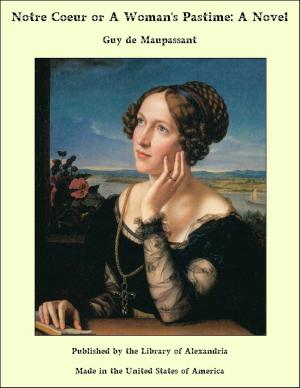Monica: A Novel (Complete)
Nonfiction, Religion & Spirituality, New Age, History, Fiction & Literature| Author: | Evelyn Everett-Green | ISBN: | 9781465616166 |
| Publisher: | Library of Alexandria | Publication: | March 8, 2015 |
| Imprint: | Language: | English |
| Author: | Evelyn Everett-Green |
| ISBN: | 9781465616166 |
| Publisher: | Library of Alexandria |
| Publication: | March 8, 2015 |
| Imprint: | |
| Language: | English |
“Good-bye, Monica. I will look in again to-morrow: but I assure you there is no cause for anxiety. He is not worse than usual, and will be better soon.” The doctor was buttoning up his heavy driving-coat as he spoke, and at the conclusion of the sentence he opened the heavy oak door, letting in a blast of cold air and a sheet of fine, penetrating rain. “Oh, Raymond, what weather! I ought not to have sent for you.” “Nonsense! You know I am weather-proof. Old Jack will find his way home, if I cannot. Good-bye again.” The door closed upon the stalwart figure, and Lady Monica Trevlyn was left standing alone upon the wide staircase, amid the gathering shadows of the great hall. Castle Trevlyn was, in truth, a sufficiently grim and desolate place, both within and without. Tangled park, dense pine woods, and a rocky iron-bound coast surrounded it, cutting it off, at it were, from communication with the outside world. Within its walls lay a succession of vast, stately chambers, few of them now inhabited—regions where carved black oak, faded tapestry, rusty armour, and antique relics of bygone days seemed to reign in a sort of mournful grandeur, telling their own tale of past magnificence and of present poverty and decay. Yes, the Trevlyns were a fallen race; for the past three generations the reigning earl had been poor, and the present Lord Trevlyn had failed to do anything towards restoring the decaying fortunes of his house. He too was very poor, hence the air of neglect that reigned around and within the castle. Monica, however, his only child, was far too well used to the gloom and grimness of the old castle to be in the least oppressed by it. She loved her lonely, desolate home with a curious, passionate intensity, and could not picture anything more perfect than the utter silence and isolation that hemmed in her life. The idea of desiring a change had never so much as occurred to her. Monica was very beautiful, with a beauty of a rare kind, that haunted the memory of those who saw her, as a strain of music sometimes haunts the ear. Her face was always pale and grave, and at first sight cold even to hardness, yet endued with an underlying depth and sweetness that often eluded observation, though it never failed to make itself felt. It was a lovely face—like that of a pictured saint for purity of outline, of a Greek statue for perfection of feature—almost as calm and colourless as marble itself. Yet, behind the statuesque severity lay that strange, sad, wistful sweetness which could not quite be hidden away, and gave to the beholder the idea that some great trouble had overshadowed the girl’s life. Let us go with her, and see what that trouble was.
“Good-bye, Monica. I will look in again to-morrow: but I assure you there is no cause for anxiety. He is not worse than usual, and will be better soon.” The doctor was buttoning up his heavy driving-coat as he spoke, and at the conclusion of the sentence he opened the heavy oak door, letting in a blast of cold air and a sheet of fine, penetrating rain. “Oh, Raymond, what weather! I ought not to have sent for you.” “Nonsense! You know I am weather-proof. Old Jack will find his way home, if I cannot. Good-bye again.” The door closed upon the stalwart figure, and Lady Monica Trevlyn was left standing alone upon the wide staircase, amid the gathering shadows of the great hall. Castle Trevlyn was, in truth, a sufficiently grim and desolate place, both within and without. Tangled park, dense pine woods, and a rocky iron-bound coast surrounded it, cutting it off, at it were, from communication with the outside world. Within its walls lay a succession of vast, stately chambers, few of them now inhabited—regions where carved black oak, faded tapestry, rusty armour, and antique relics of bygone days seemed to reign in a sort of mournful grandeur, telling their own tale of past magnificence and of present poverty and decay. Yes, the Trevlyns were a fallen race; for the past three generations the reigning earl had been poor, and the present Lord Trevlyn had failed to do anything towards restoring the decaying fortunes of his house. He too was very poor, hence the air of neglect that reigned around and within the castle. Monica, however, his only child, was far too well used to the gloom and grimness of the old castle to be in the least oppressed by it. She loved her lonely, desolate home with a curious, passionate intensity, and could not picture anything more perfect than the utter silence and isolation that hemmed in her life. The idea of desiring a change had never so much as occurred to her. Monica was very beautiful, with a beauty of a rare kind, that haunted the memory of those who saw her, as a strain of music sometimes haunts the ear. Her face was always pale and grave, and at first sight cold even to hardness, yet endued with an underlying depth and sweetness that often eluded observation, though it never failed to make itself felt. It was a lovely face—like that of a pictured saint for purity of outline, of a Greek statue for perfection of feature—almost as calm and colourless as marble itself. Yet, behind the statuesque severity lay that strange, sad, wistful sweetness which could not quite be hidden away, and gave to the beholder the idea that some great trouble had overshadowed the girl’s life. Let us go with her, and see what that trouble was.















